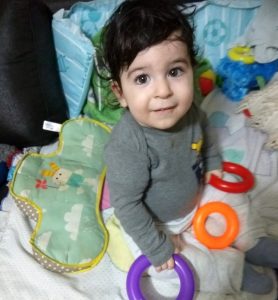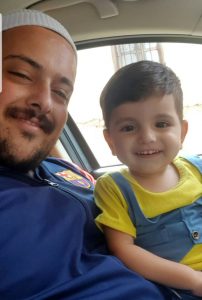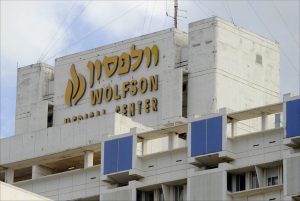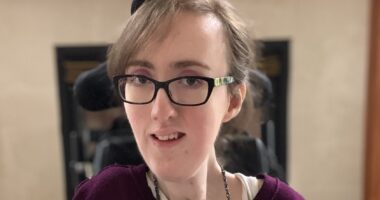In Historic Move, Israeli Insurer to Cover Cost of Zolgensma for 2 SMA Babies
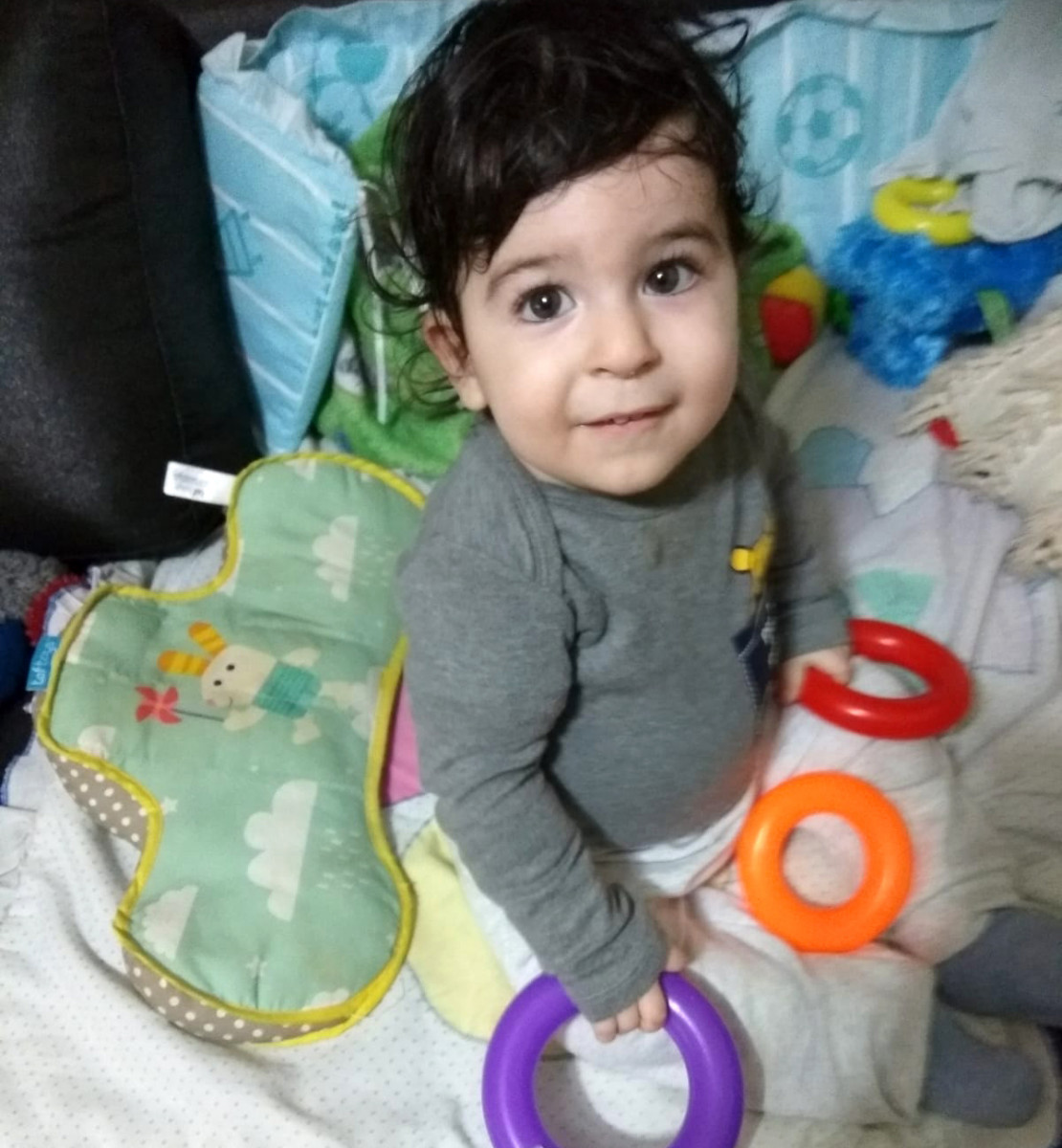
Liam Samuel Nagi, who has SMA type 1, is one of two Israeli babies approved to receive Zolgensma gene therapy. (Photo courtesy of Emily Nagi)
In an unprecedented decision reached Sept. 26 on the eve of Rosh Hashana — the Jewish New Year — Israel’s top health insurer, Clalit, said it would cover the $4.25 million cost of one-time Zolgensma gene therapy for two Israeli babies born with spinal muscular atrophy (SMA).
The timing couldn’t have been better for the families of the two little boys — one, Orthodox Jews from suburban Tel Aviv; the other, Arabic-speaking Druze from Israel’s northern Galilee region.
In December, both toddlers will celebrate their second birthdays, after which they would no longer have been eligible for the lifesaving infusion.
“We were all completely taken by surprise,” said Emily Nagi, the mother of Liam Samuel Nagi, who lives in Petah Tikva with her husband, Aviran. “Even now, it’s still hard for us to believe. We want to say ‘thank you’ to Clalit for doing this.”
Nagi, speaking to SMA News Today in Hebrew, said that her son has already received eight injections of the Biogen treatment Spinraza (nusinersen), which became available through Israel’s state sal bri’ut or “health basket” in late 2017 only after a series of loud and angry protests at the Ministry of Health in Jerusalem by dozens of parents of children with SMA.
“Spinraza has helped with his motor skills, but it hasn’t treated the respiratory problems well enough,” she said of Liam, who turns 2 on Dec. 3. “He still needs oxygen at night.”
Batsheva Goldman-Ida, the boy’s grandmother, said that in order to bolster the family’s case, she requested and received some 400 documents from the U.S. Food and Drug Administration (FDA), which approved Zolgensma this past May as the first gene therapy for pre-symptomatic newborns up to 2-year-olds with any type of SMA.
Retailing in the U.S. for $750,000 the first year and $375,000 every year after, Spinraza easily ranked as one of the most expensive drugs at the time of its FDA approval in late 2016.
Want to learn more about Zolgensma? Ask questions and share your knowledge in our SMA forums.
Yet Zolgensma easily eclipses the cost of Spinraza; the 60-minute infusion costs $2.125 million per patient, making it the most expensive medicine in history.
For the two babies alone, the drug will cost Israeli taxpayers 7.6 million shekels ($4.25 million). But in the long run, it’s cheaper than Spinraza, which must be given every three months for the rest of a patient’s life.
Racing against the clock
According to senior Israeli health officials, Clalit gave its blessing after reaching a special payment agreement with AveXis, the subsidiary of Swiss pharma giant Novartis that actually developed the drug. Zolgensma is marketed in Israel by Netanya-based TrueMed, which specializes in orphan medications.
Approval came through a health maintenance organization exception committee, which reviews applications for drugs not included in the health basket. In addition, payment is to be spread over four to six years rather than reimbursed all at once.
Asked when her grandson would actually receive Zolgensma, Goldman-Ida said she hopes it’ll happen as soon as possible.
“He needs certain inoculations beforehand, so after the holidays [Rosh Hashana and the Jewish day of atonement, Yom Kippur, which this year falls on Oct. 9], there will soon be a meeting to work out the program of treatment,” she said. “We just don’t know yet.”
The other infant set to receive Zolgensma is Jude Naser-al-Din, from the Druze village of Kisra-Sumia, near Israel’s border with Lebanon.
“We’re very grateful for this decision,” said his father, Yadin Naser-al-Din. “Many people worked hard to make this happen — doctors, lawyers and others. We are so happy.”
Yael Friedl, an attorney who represented both families, said her argument was very simple: that Zolgensma is better and more cost-effective in the long run than Spinraza, and that time was running out.
“These two kids needed Zolgensma, but both are going to be 2 years old in December, and they couldn’t wait until next year. But the FDA approved the drug only up to the age of 2, so even if it was approved for the health basket, it wouldn’t have helped them. That’s why they had to file a special appeal to Clalit to get the therapy.”
130 SMA patients in Israel
On the other hand, because no doctor in Israel has ever given Zolgensma, there’s little knowledge of how the drug works, she said. There’s also uncertainty that the gene therapy would indeed be a one-off; some experts speculate a follow-up infusion might be necessary as a child with SMA grows.
“Since this drug is so expensive, we expected them to say no, and to have this go to trial,” she said. “It’s a miracle they said yes, because it would have been very easy to refuse to pay.”
A New Jersey-sized country of 9.1 million inhabitants, Israel is home to 130 or so people with SMA, including 15 to 20 children younger than 2. Yet not all babies with the neuromuscular disease have been so lucky, Friedl said.
One month ago, a Jewish boy from the West Bank settlement of Qiryat Arba was denied Zolgensma because his health maintenance organization, Meuchedet, declined to pay for the drug. Friedl said the irony was that the boy’s mother moved to Israel from her native Russia so that he could access Spinraza, which he began receiving at one month of age.
Michal Rosentraub, who lives in the Mediterranean coastal town of Atlit, just south of Haifa, belongs to the nonprofit group Families of SMA Israel. Her 10-year-old daughter, Lior, has SMA type 1; as a result, she’s 100% paralyzed but no longer needs ventilation during the day. She attends a regular school and can speak, though not very clearly.
“This is the first public reimbursement of Zolgensma in Israel as far as I know. It’s a surprising and very happy announcement,” Rosentraub said. “But still, it’s a long way until Zolgensma is approved for all the patients who need it.”
Four hospitals are equipped to administer Spinraza in Israel: Tel Aviv Sourasky Medical Center (also known as Ichilov); Schneider Children’s Medical Center in Petah Tikva; Wolfson Medical Center in Holon, and Hadassah Medical Center in Jerusalem.
But for now, Zolgensma infusions will take place principally at Ichilov, said pediatric neurologist Liora Sagi, who is treating both babies.
“There are medical issues to be addressed before giving this treatment. We’ve already had all the conversations with those who conducted the trials,” said Sagi, who declined to speculate on when the two toddlers will actually receive the drug.




